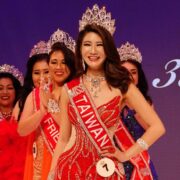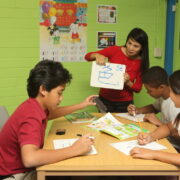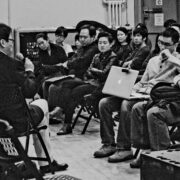Taiwanese American Center of Northern California – Our Dream Comes True
Author: May-Sing Chang
“Wow!!!” is the long exclamation that every community member makes when they step into the magnificent new Taiwanese American Center for the first time, and I am no exception. Every time I hear this exclamation, my heart is filled with unbound joy and gratitude.
I still remember when I moved to the Bay Area from Oklahoma in 1988, just at the time when Taiwan’s democratic movement was flourishing. Every Saturday, we would gather dozens of fellow Taiwanese to eat together, reminisce about home, and organize activities to support Taiwan. We had a collective aspiration: Taiwanese people needed a fixed meeting place that could be used to run meetings, hold activities, and to consolidate the force of the Taiwanese American community around a central goal. This place could be used to promote Taiwanese culture, enhance our community’s visibility, encourage exchange between Taiwanese Americans and other ethnic groups, and to make it so that the American public would not dare to underestimate the strength of the Taiwanese American community. Thus, my husband and I invited some like-minded friends: Te-hui Chen, Chun Chiu, Tien-mo Lin, David Weng, Ching C. Shir, Tien-tun Shih, Kuang-po Chen, Hwalin Lee, and Davis Chang. Together, we founded Northern California’s first public Taiwanese American Center in Fremont, in March of 2003. This was the first step towards making our dream into reality; the 2,800 square foot building wasn’t very big, but it provided us warmth. It formed the foundation of our dream, and it nurtured us as we gathered up enough energy to spread our wings and fly.
In May of 2003, under the careful guidance and planning of Shu-chen Kao, the Center began offering more than 20 life-enrichment courses, frequently hosting various lectures on politics, economics, culture, and health, and hosting an annual large-scale music concert. Especially notable among these concerts is the performance by SEMISCON Vocal band in 2006, the Dream of Formosa concert in 2007, where more than 250 choir singers and orchestra members came from National Taiwan Normal University to perform, and the 2008 concert, where Taiwanese music masters and rock-and-roll band, Chai Found Music Workshop, performed. The Center rented out Northern California’s most luxurious Jubilee Christian Church to hold these concerts. Each concert was attended by more than 3,000 people, an unprecedented success that is all thanks to the community members listed above, as well as the other board members who gradually joined us over the years: Chen-Ho Wu, Chin-tang Lin, Ye-Ming Wu, Henry Wu, Hsin-hung Li, Chun-chun Chuang, Shih-chang Chang, and Ming Tang Lai, who all worked together, giving their money and time without expected any rewards. This successful result is also thanks to the many fellow community members and friends who volunteered, selflessly dedicating themselves to our cause.
Of course, the Center is being actively used by the local Taiwanese associations and organizations. In September of 2004, when America’s very first Taiwanese school was established, we began to feel that the location we were using at the time for the Taiwanese American Center was too small, and thus insufficient for our purposes. My husband, Shinn-Sheng Chang and I began to look for a more suitable location with more parking spaces and a total area of 10,000 square feet. In 2007, Shinn-Sheng Chang turned over the position of chairman to Te-hui Chen, whose primary objective was to continue the search for a new building. Chairman Chen felt that since the economy was down and housing prices had dropped that year, it would be a good opportunity to purchase a property. Every day after work, he would drive around with his wife, Yeh-chin, looking for a location, while also entrusting part of the search to an agency. After two years passed, he lamented during a director’s meeting, “I didn’t think finding a new location for the Center would be so difficult. Looking for it has nearly driven me into depression!” I can only imagine how much work he had expended over those two years. In the Bay Area, Fremont, Milpitas, and San Jose do not allow properties to be changed for non-profits. This is because the government cannot collect taxes from non-profits, and most of the technology companies in Silicon Valley have small 1,000 square foot buildings with only one parking space, while a community center needs a 10,000 square foot building. Most buildings had 12 parking spaces maximum, so finding a place with a 10,000 square foot building and hundreds of parking spaces was going to be as difficult as ascending into Heaven.
At one point, I learned from David Weng and Chun Chiu that the Canaan Church was becoming more and more prosperous, so they were slowly growing out of their building and were looking to find a new one. I then asked Chairman Te-hui Chen whether the Taiwanese American Center and Canaan Church could jointly buy a single large building, which would likely have hundreds of parking spaces and all of the structural elements needed to serve our community. This place could become the spiritual fortress and common home for Taiwanese Americans for generations to come, which would be truly incredible! After that, when David Weng went to look at locations, he frequently invited Te-hui Chen, Shinn-Sheng Chang, and myself to go with him to inspect the location. Each time we finished looking at a new location, David Weng encouraged me to pray more, and I followed his instructions, piously asking God to help us every day. I am endlessly grateful to God, for in March 0f 2009, we finally found our current location in the Golden Triangle district of San Jose. Since it was difficult to clearly divide the property, the fastest solution was to rent the second floor of the building, which measured 8,400 square feet, from the Canaan church. The new location was spacious, with moderate traffic, and had 400 parking spaces. It was like a miracle; with the passionate volunteer work of architect Shih-min Chao from Emmanuel church who used the most economical planning and design, the full renovation provided to us at no cost from Jason Wu of Canaan Church, and the daily supervision of Director Hsin-hung, we were able to make complete our vision. Even the stage and movable audio cabinets were handmade, and thus the Center was able to begin operations starting in early May, which attracted the support and participation of even more community members and organizations, while our programs became even richer and more diverse.
In line with the mission of serving the Taiwanese American community, the Center has created programs suitable for all ages: Each Monday, Canaan Church elder Yen-kuang Lin and sister Ming-yuan Wu join with sister Fang-yao Chen to teach a course called “Interpersonal Relations,” which allows us to leader how to ease interpersonal interactions by reducing friction through empathy and mutual respect. Each Tuesday, elder Yen-kuang and sister Fang Yao lead “Bible Study,” which is quite alternative. In addition to reading the scriptures, we share aspects of our practice life. We each have different achievements in our fields, whether we are involved in academic, agricultural, commercial, or industrial fields, but when it comes to our real lives, we all have areas where we need to catch up. During this time, we all take the Bible as our inspiration and share our lives with each other, letting our souls fly free and be liberated. This kind of happiness doesn’t require you to spend a single cent, and even if you have all the money in the world, you could never purchase it. Each Wednesday is reserved for Mei-ho Hung and the “Symphony of Hearts” that she has led for many years. Her programs are diverse, covering how the intellectual, emotional, physical, and mental aspects of the self can be tempered. Even more touching is that Mei-ho and her husband, L. J. Chen, always prepare two or three large dishes as lunch for the people in attendance, so that everyone is both physically and mentally nurtured. On Wednesday afternoons, Chung-hsiung Yu provides a session on opera appreciation and travel knowledge to help you improve your quality of life, so that you can dream-travel the entire world without spending a single cent. Each Thursday, the members of Canaan church jointly host “Happy Senior Day,” which is heavily applauded. Starting in the morning, under the guidance of sister Fang Yao’s warm and sweet smile, the entire hall is filled with the same belief: activity and exercise, and the same goal: taking care of their bodies. They try hard to twist their waists, swing their limbs, wearing a satisfied smile. When their muscles and bones are relieved, and their whole bodies are relaxed, small groups of friends gather together to sing, drink tea, chat, stimulate their minds, play Mahjong (just for entertainment), play bridge, or engage in the four arts: guqin, Go, calligraphy, and painting. Retirement can be this easy and enjoyable; there’s no need to envy Warren Buffet. On Friday, Master Chun-hsiung Lin’s qigong class allows you to practice controlling your body and your qi, which he combines with the concept of self-cultivation to help you achieve the goal of complete physical and mental health, so that living until age 120 is not a mere fantasy. On the third Saturday of each month, the “Taiwan Culture Series,” organized by Director Hwalin Lee, uses the combination of videos and music to allow us to participate in the culture of our mother country without feeling absent. Each Sunday, the Taiwanese school, which is led by Principle Pei-li Tai and Dean Fang-yao Chen, offers courses with curricula designed for all generations: elderly, middle aged, and youth. From age two and up, the entire family can attend personal growth courses, which are offered in a range of languages: Taiwanese, Chinese, Japanese, Italian, CSL, and more. Musical categories include children’s musical programs, which combine singing, moving, and playing with skits, and guitar, piano, keyboard, and choral programs. The art programs include folk art, painting, computer design, and Photoshop, while sports programs include dance, rhythm, basketball, Wing Chun (Kung Fu), and more. Other miscellaneous programs with unspecified intervals include financial management, health, current events lectures, and community lectures; it is a truly dazzling array of activities. The Taiwanese who live in the Bay Area are truly fortunate!
Though only a year and a half have passed since the relocation of the Taiwanese American Center, the Center has grown quite rapidly. I am sincerely grateful that over these past seven years, for the goal of upholding our common ideals and our mission of continuing to love our ancestral Taiwan, the board of directors and our super volunteers selflessly spent both money and effort: Li-hsueh Chang, Han-chung Chang, Shang-mei Chen, Chi-shuo Teng, Li-chin Wang, Hui Chun, Chia-po Huang, Wei-lin Chang, Chung-te Chien, I-yen Chang, Yuan Tzu, Yu-li Kao, Yu-ying Chu, Chung Hung, Shu Chen, Chu Mei, Mu-fa Chen and his wife (and sponsored by Ting-hsiu Liu and his wife, who invited a professional interior designer for the Center). Without all of you, the Center would not be here today. We will continue to work hard to continuously improve the Center so that we can better serve our community. Especially because we hope to increase our popularity, we wholeheartedly welcome the second generation to use the building for free; moreover, we will provide various kinds assistance with the hopes of maintaining sustainable development for the Center.
During the construction phase for this new Center, every brick and tile was expectantly waiting for the Taiwanese community to come participate. Anywhere you go, you always leave a trace. I hope that in this special moment, you can leave behind your own beautiful footprint on the Taiwanese American Center’s “Honor Wall.” I sincerely offer my deepest gratitude!
Excerpt from the Taiwanese American Center of Northern California 2010 Journal
Translated from 53. 台灣會館美夢成真 / 黃美星





